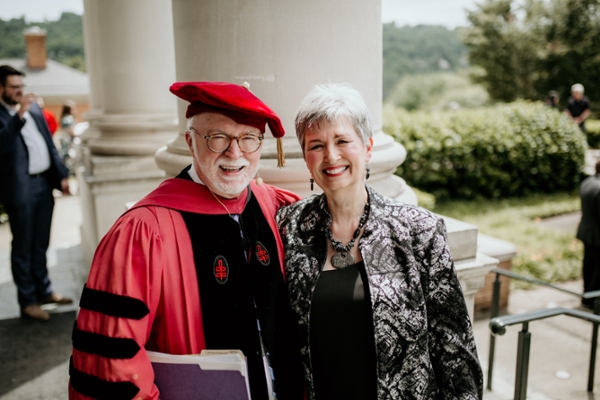
Dr. Timothy George is today's Friday Faculty Feature. He was the founding dean of Beeson Divinity School, and now serves at the school as distinguished professor of divinity, teaching history and doctrine. Originally from Chattanooga, Tennessee, Dr. George is married to Denise, and they have two children and one grandson.
You now serve as a distinguished professor of divinity, after having retired as the school’s dean for 33 years. How does it feel to be back in the classroom on a regular basis?
I have forgotten how much fun teaching can be. That’s really what I was called to do—to preach and teach. So, I have loved being back in the classroom, and I have wonderful students. My students are engaged with the material, and they ask good questions. As a professor, your students are your best teachers because they push you with their questions. So, I am learning new things all the time.
How do you understand your vocation as a professor?
It is a kind of spiritual formation. I think that would be true no matter the discipline at a school like Beeson. I always want to bring the material to bear on the question of the Christian life and what we can learn from our many brothers and sisters in the past about the questions we face today and about what our blind spots may be. Often by studying the past, we discover what we thought were great pools of clarity are, in fact, great obscurities. We have to dig deeper and be confronted all over again with the freshness of the Christian message.
One thing I have learned from the great Christian tradition is that we have much to learn from our “speaking cousins.” We have to respect them with of all their many failures and blind spots, knowing that we have the same ourselves. So, when you go into the study of the Christian past, you go in with an open mind and heart. We study history in order to gain perspective, to enlarge our coordinates and to catholicize our heresies.
You have authored, co-authored, and edited dozens of books over the years, including your recently published commentary on Galatians in the Christian Standard Commentary Series. Please share with us a little bit about this project and other writing projects that you are currently working on.
The first edition of my commentary on Galatians was published 25 years ago in 1994 in the New American Commentary series. When Broadman and Holman decided to bring out a new commentary series called The Christian Standard Commentary (CSC), I was delighted they chose my commentary on Galatians to be a part of it. It was great fun but also a lot of hard work to revise and update this volume for a new generation. This was released in November 2020. I am also working on a one-volume history of the Baptist movement and am co-writing a book with Kristen Padilla titled, The Mothers of the Reformation. Recently I was asked to write a memoir, but we will see where that idea goes…
What are some important lessons you hope students will learn from you?
I hope my students will learn the necessity of the past and its relevance for our present and future. As it has once been said, “The past is not past,” rather it belongs to us. And I want our students to enter into and appreciate it, not glamorize or idolize it. We have to look at it critically, thoughtfully and empathetically. I hope this will contribute in ways to their own spiritual growth and nurture.
Why Beeson?
We are looking for students who are committed to the heart-and-life preparation our curriculum emphasizes. If you are looking to prepare well for a lifetime of ministry, then Beeson should be at the top of your list. We are not the fastest, easiest, or cheapest but the challenge of a Beeson education is not just academic, but it also has to do with the formation of a lifetime of work and ministry. Beeson embodies the classic, great tradition of theological education.
What is a fun fact (or facts) people may not know about you?
I used to be a table tennis champion in college. I have climbed the 600 stone stairs up Skellig Michael, a monastic island off the coast of Ireland. My favorite music: bluegrass and Bach.
